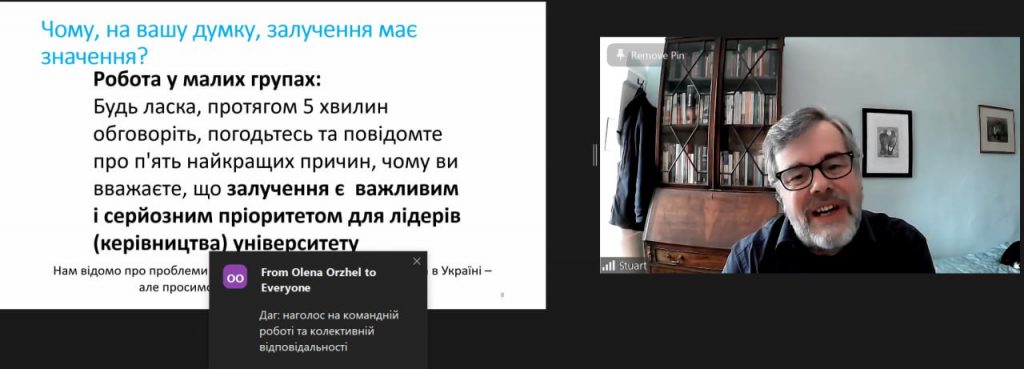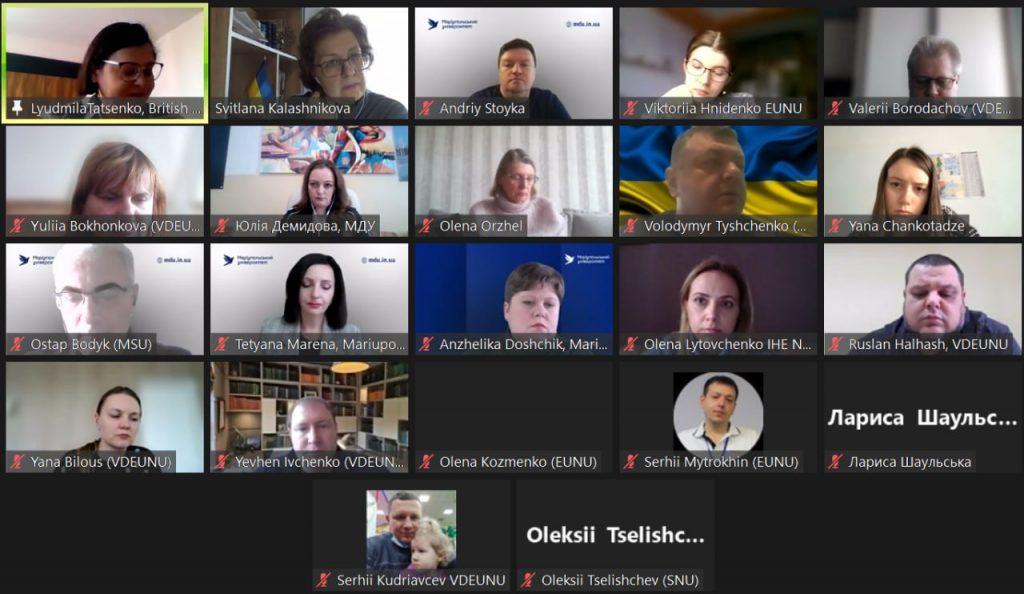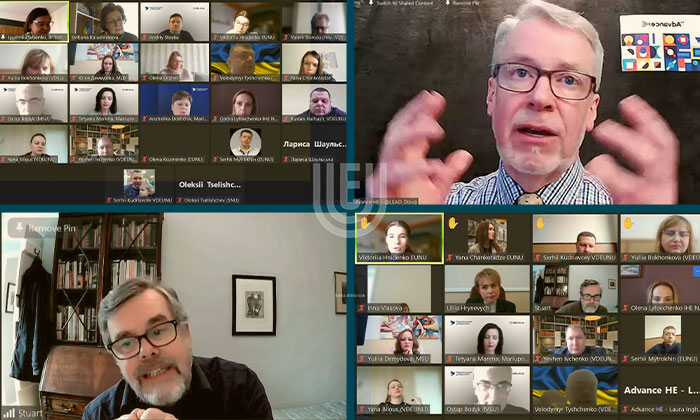Regular sessions of the training “Strategizing in Higher Education” were held within the framework of the EU Project “Restoring Displaced Universities: Increasing Competitiveness, Supporting Communities”.
The training for participants from Volodymyr Dahl East Ukrainian National University and Mariupol State University was developed according to the content areas identified jointly by experts from the Institute of Higher Education of the National Academy of Sciences of Ukraine, the British Council in Ukraine, the British charitable and professional membership program Advance HE, which promotes excellence in higher education, and British experts Doug Parkin and Stuart Hunt.
At the first session on the topic: “Vision and Strategy” the following issues were discussed:
- Some definitions of strategy and why it is important
- Strategic thinking and strategic planning
- How to “catch” and express your “why?”
- Strategic thinking tools
- Multiple horizons and planning scenarios
- Vision – focus and choice – attraction to the future.
During this session, the participants worked in groups according to the tasks of Mr. Parkin, who, summarizing the session, thanked for the excellent, very useful ideas expressed, for the messages of purpose, dynamic vision that meets the challenges of change facing universities in today’s environment.
During the second session on the topic: “Strategy, understanding systems and how to be strategic”, the following issues were worked out:
- Introduction to systems thinking (in relation to strategy)
- Understanding the organization as a strategic ecosystem
- Using feedback and multiple information trajectories
- Practical skills of thinking about stakeholders and their needs
- Searching for and finding a direction of movement while remaining flexible and responsive
- Integrating strategy into a single whole and the pitfalls of strategic planning
- The art of being strategic.
Summarizing the second session of the training, Doug Parkin emphasized: “When defining the first and next steps towards your goal, you have to formulate it in one sentence. It should be a smart goal – measurable in time, achievable, important, empowering, rewarding and motivating. This has been a great session. I want you to remember that a strategy will never develop in a straight line, it has to be agile, respond to challenges, and be guided by principles. The more complex the plan, the more likely it is to fail. Think about the ecosystem, efficiency, philosophy, and people. Don’t think about the Strategy without thinking about systems – we work in systems and need to understand them.”
At the third session on the topic: “Engagement”, the following issues were discussed:
- Why is ‘engagement’ such an important issue?
- How do we know if our colleagues are engaged or not – and what are the symptoms of both engagement and disengagement?
- Freedom of choice does not equal lack of accountability – the role of the leader, motivation and semi-structured conversation
- Teams and teamwork
- Communication strategy

At this session, the nature of relationships and the quality of internal communication, the need for skillful and flexible leadership (management) were discussed.
At the fourth session on the topic: “Formation of Organizational Culture”, the following issues were discussed:
- What do we mean by “culture” and why is this “soft” issue an important strategic issue?
- Conducting a culture assessment – what is it like to “work here”?
- How well does our current culture align with our professed values?
- How would we like to develop our culture?
- Ways in which leaders can influence culture
- Return to the issues of engagement and communication strategies
На цій сесії були обговорені елементи організаційної культури – способу, у який в організації щось робиться та поводяться і нагороджуються співробітники тощо. З огляду на ці дії можна досить швидко зрозуміти, чи узгоджується культура із заявленими цінностями і чи це допомагає виконати місію. Тож, ефективні зміни починаються з культури.
At the final organizational session, Svitlana Kalashnikova, a project expert from the Institute of Higher Education of the National Academy of Sciences of Ukraine, reported on the next trainings within the EU project “Restoring Displaced Universities: Increasing Competitiveness, Supporting Communities”.


